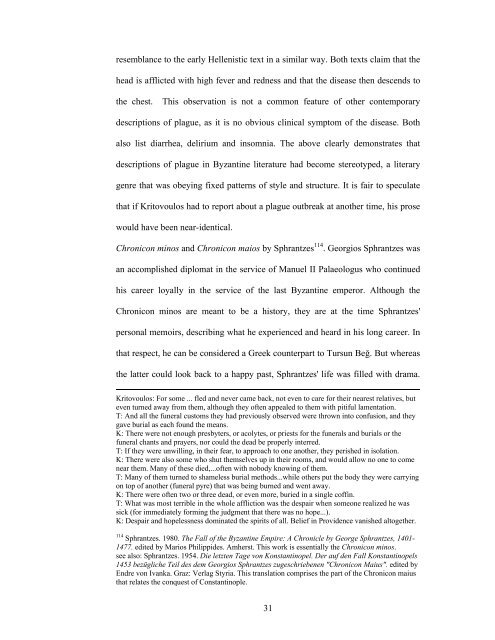the black death in early ottoman territories - Bilkent University
the black death in early ottoman territories - Bilkent University
the black death in early ottoman territories - Bilkent University
Create successful ePaper yourself
Turn your PDF publications into a flip-book with our unique Google optimized e-Paper software.
esemblance to <strong>the</strong> <strong>early</strong> Hellenistic text <strong>in</strong> a similar way. Both texts claim that <strong>the</strong><br />
head is afflicted with high fever and redness and that <strong>the</strong> disease <strong>the</strong>n descends to<br />
<strong>the</strong> chest. This observation is not a common feature of o<strong>the</strong>r contemporary<br />
descriptions of plague, as it is no obvious cl<strong>in</strong>ical symptom of <strong>the</strong> disease. Both<br />
also list diarrhea, delirium and <strong>in</strong>somnia. The above cl<strong>early</strong> demonstrates that<br />
descriptions of plague <strong>in</strong> Byzant<strong>in</strong>e literature had become stereotyped, a literary<br />
genre that was obey<strong>in</strong>g fixed patterns of style and structure. It is fair to speculate<br />
that if Kritovoulos had to report about a plague outbreak at ano<strong>the</strong>r time, his prose<br />
would have been near-identical.<br />
Chronicon m<strong>in</strong>os and Chronicon maios by Sphrantzes 114 . Georgios Sphrantzes was<br />
an accomplished diplomat <strong>in</strong> <strong>the</strong> service of Manuel II Palaeologus who cont<strong>in</strong>ued<br />
his career loyally <strong>in</strong> <strong>the</strong> service of <strong>the</strong> last Byzant<strong>in</strong>e emperor. Although <strong>the</strong><br />
Chronicon m<strong>in</strong>os are meant to be a history, <strong>the</strong>y are at <strong>the</strong> time Sphrantzes'<br />
personal memoirs, describ<strong>in</strong>g what he experienced and heard <strong>in</strong> his long career. In<br />
that respect, he can be considered a Greek counterpart to Tursun Beğ. But whereas<br />
<strong>the</strong> latter could look back to a happy past, Sphrantzes' life was filled with drama.<br />
Kritovoulos: For some ... fled and never came back, not even to care for <strong>the</strong>ir nearest relatives, but<br />
even turned away from <strong>the</strong>m, although <strong>the</strong>y often appealed to <strong>the</strong>m with pitiful lamentation.<br />
T: And all <strong>the</strong> funeral customs <strong>the</strong>y had previously observed were thrown <strong>in</strong>to confusion, and <strong>the</strong>y<br />
gave burial as each found <strong>the</strong> means.<br />
K: There were not enough presbyters, or acolytes, or priests for <strong>the</strong> funerals and burials or <strong>the</strong><br />
funeral chants and prayers, nor could <strong>the</strong> dead be properly <strong>in</strong>terred.<br />
T: If <strong>the</strong>y were unwill<strong>in</strong>g, <strong>in</strong> <strong>the</strong>ir fear, to approach to one ano<strong>the</strong>r, <strong>the</strong>y perished <strong>in</strong> isolation.<br />
K: There were also some who shut <strong>the</strong>mselves up <strong>in</strong> <strong>the</strong>ir rooms, and would allow no one to come<br />
near <strong>the</strong>m. Many of <strong>the</strong>se died,...often with nobody know<strong>in</strong>g of <strong>the</strong>m.<br />
T: Many of <strong>the</strong>m turned to shameless burial methods...while o<strong>the</strong>rs put <strong>the</strong> body <strong>the</strong>y were carry<strong>in</strong>g<br />
on top of ano<strong>the</strong>r (funeral pyre) that was be<strong>in</strong>g burned and went away.<br />
K: There were often two or three dead, or even more, buried <strong>in</strong> a s<strong>in</strong>gle coff<strong>in</strong>.<br />
T: What was most terrible <strong>in</strong> <strong>the</strong> whole affliction was <strong>the</strong> despair when someone realized he was<br />
sick (for immediately form<strong>in</strong>g <strong>the</strong> judgment that <strong>the</strong>re was no hope...).<br />
K: Despair and hopelessness dom<strong>in</strong>ated <strong>the</strong> spirits of all. Belief <strong>in</strong> Providence vanished altoge<strong>the</strong>r.<br />
114 Sphrantzes. 1980. The Fall of <strong>the</strong> Byzant<strong>in</strong>e Empire: A Chronicle by George Sphrantzes, 1401-<br />
1477. edited by Marios Philippides. Amherst. This work is essentially <strong>the</strong> Chronicon m<strong>in</strong>os.<br />
see also: Sphrantzes. 1954. Die letzten Tage von Konstant<strong>in</strong>opel. Der auf den Fall Konstant<strong>in</strong>opels<br />
1453 bezügliche Teil des dem Georgios Sphrantzes zugeschriebenen "Chronicon Maius". edited by<br />
Endre von Ivanka. Graz: Verlag Styria. This translation comprises <strong>the</strong> part of <strong>the</strong> Chronicon maius<br />
that relates <strong>the</strong> conquest of Constant<strong>in</strong>ople.<br />
31
















